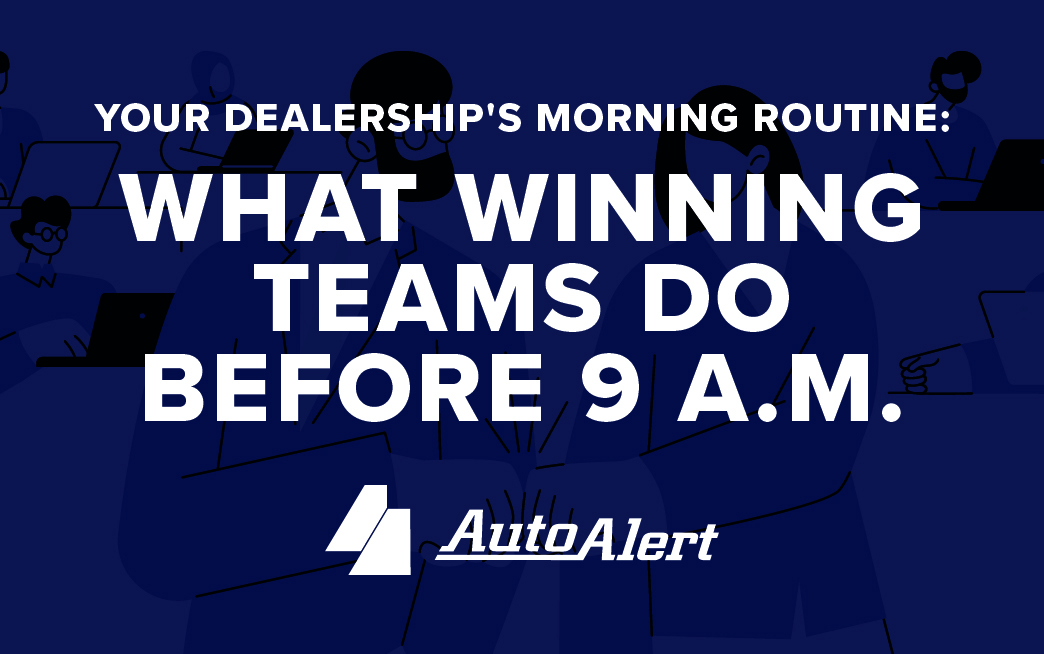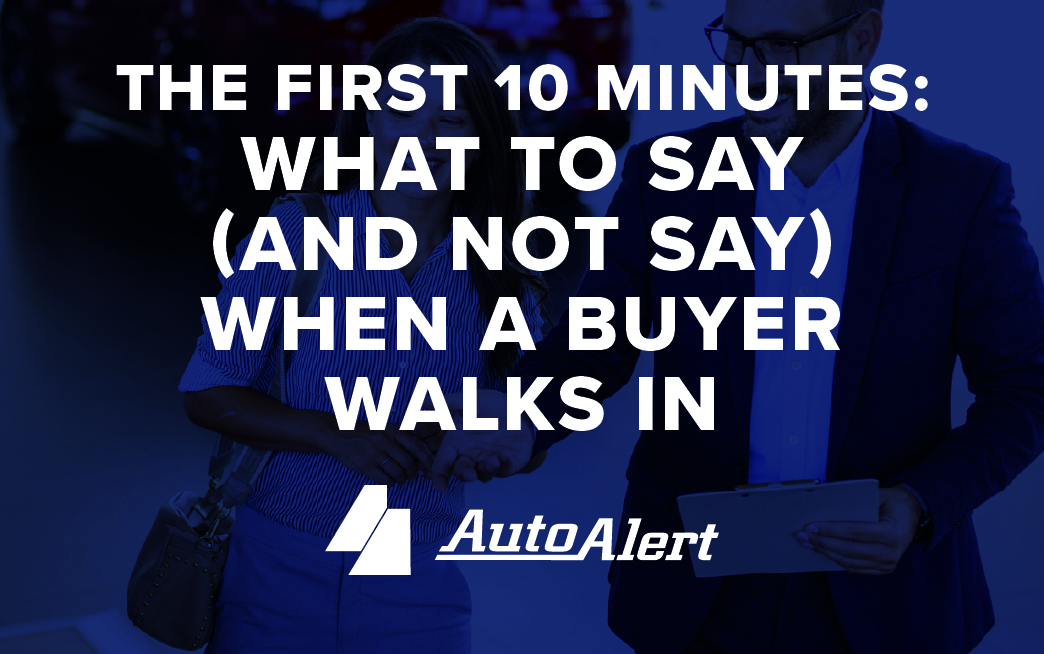12 Skills of a Great Car Salesman
A great car salesman needs more than just a good pitch to succeed. It’s a multifaceted role that requires a combination of interpersonal skills, product knowledge, and strategic thinking. It is someone who understands the power of continuous learning and personal evaluation to reach goals, and putting the customer at the center ultimately allows the chips to fall into place.
Here are 12 essential car salesman skills that, when mastered, ensure success:
In this article you will find the subjects:


1. Master Communication to Close More Car Deals
Effective communication with customers is incredibly important in any sales role. A great car salesperson can articulate a vehicle’s features and benefits while clearly and confidently addressing customer questions and concerns. Developing strong verbal and nonverbal communication skills to build trust, handle difficult conversations, and connect with a diverse range of customers can transform you from a decent car salesperson into a great one. This includes active listening skills. Listening to customers’ needs and preferences builds trust and is necessary to understand their requirements. By actively listening, the salesperson gains knowledge and can offer tailored solutions that resonate with the buyer.


2. Develop a Strong Work Ethic for Sales Success
Hustling as a car salesperson is hard work, day in and day out, so you must love what you’re doing. A good work ethic ensures you approach each day with focus, determination, and a commitment to exceptional service—qualities that differentiate great salespeople from the average.
A strong work ethic directly impacts your ability to build trust, achieve consistent success, and cultivate long-term customer relationships. Being punctual, prepared, and dependable demonstrates that you take your job and customer needs seriously. It also motivates you to put in the necessary effort even when deals don’t immediately close. Consistently applying yourself builds a solid foundation for sustained success.


3. Manage Time Wisely to Sell More Cars
Efficient time management is essential in a fast-paced sales environment. To optimize your day, determine how to prioritize tasks effectively, focus on high-value activities, and reduce wasted time. A great strategy is to bundle similar tasks (e.g., returning all calls or emails simultaneously) to avoid switching your attention. Set time limits for each task to motivate you and remind you that wasted time is wasted profit.
Focus on long-term productivity, not just the current moment. Leveraging time-saving tools and investing time in building daily task strategies, schedules, and organizational habits reduces wasted time and keeps you moving toward your goals. Keeping a clean, up-to-date database of contacts and consistently following through on commitments ensures you remain on task and do not overlook opportunities.


4. Sharpen Closing Skills to Increase Conversions
Ultimately, the ability to close deals separates good salespeople from great ones. Mastering the art of persuasion and negotiation is critical to closing deals. A great salesperson can present compelling arguments and find mutually beneficial terms.
A skilled closer knows how to create urgency, overcome objections, and guide the customer to a decision. This isn’t to say you should undermine the customer or try to get them to do something outside their comfort zone. However, you must express confidence and be fluid to continue the relationship and complete the sale.
Focusing on your presentation, listening skills, and objection-handling techniques will enhance your abilities and competence and allow you to close more deals. Most importantly, treat every customer as a long-term client if you want long-term success.


5. Track Performance to Boost Dealership Sales
Tracking and analyzing performance can identify strengths, disclose weaknesses, and improve sales abilities. Digital tools like dealership CRM software or spreadsheets can track daily activities, customer interactions, sales, and conversion rates.
Analyze the data for insights and where adjustments can be made. Identify patterns or trends, look for areas that need improvement, and make plans to modify. Set goals to challenge yourself—daily, weekly, monthly, quarterly, and annually—and regularly review your performance.
Keep optimizing your approach based on the analysis findings and comparing your abilities over time. Seeing your individual improvement motivates you to keep going, and it can also be satisfying to know that your rising level of expertise contributes to your dealership’s success.


6. Build Customer Relationships for Repeat Business
There’s a lot of pressure to hit financial goals; unfortunately, this focus can sometimes take precedence over that of the people and community you are trying to serve. Great car salespersons understand that their job isn’t just about selling cars; it’s about solving problems and fulfilling customer needs. Understanding and empathizing with the customer’s perspective helps build rapport and fosters a positive customer experience. When the customer’s interests are prioritized, they will be more inclined to leave good reviews, refer others, and repeat their business.
The same is true for participating in and giving back to the community. More than marketing or selling, taking care of people creates the biggest impact on your dealership. It’s very important to start building community relationships as early as possible and continue them so that there’s less concern about scarcity as the market inevitably ebbs and flows. If you develop built-in relationships and focus on people first, the numbers will handle themselves.


7. Stay Competitive with Ongoing Sales Training
Continually improve your knowledge and skills to make yourself a trusted expert. To stand out, you need to stay informed about your inventory, financing options, market trends, and new technologies. In-depth knowledge of the vehicles being sold, including specifications, features, and benefits, enables you to confidently answer questions and highlight the value of each car.
With technology playing an increasingly important role in automotive sales, tech savviness is as beneficial in this field as in any other modern career field. Familiarity with digital tools, online inventory systems, and CRM software is necessary. To expand your knowledge, it’s a great idea to seek out and attend workshops, webinars, and industry events.


8. Get Coaching to Improve Sales Techniques
It is often felt that we are supposed to figure things out on our own, and getting help means we don’t have “the stuff.” The opposite is true, however. The most successful people invest in a coach or mentor. This could be a paid professional or someone in your sphere who is available, interested, and willing to impart wisdom to enhance your career success, like your dealership sales manager.
The top skills of a dealership sales manager include strong customer communication, effective team leadership, strategic goal setting, and the ability to identify sales opportunities. By leveraging these skills, a coach can identify your team’s strengths and areas for improvement, creating a customized approach to refine your sales techniques. They can offer tips for improving customer communication, provide accountability for achieving goals, suggest innovative sales strategies, and help foster a growth mindset.
Feedback and encouragement from a coach can significantly boost your confidence and make you more effective in all dealership situations and scenarios.


9. Adapt to Market Changes and Sell Smarter
Automotive sales can be unpredictable, with market shifts, inventory shortages, fluctuating demand, and changing customer demands. Remaining adaptable and proactive allows you to find solutions instead of being deterred by obstacles. Staying updated on market trends, digital tools, and new sales techniques will enable you to pivot quickly and adapt to a different direction.
Car sales often involve lengthy discussions and decision-making processes. These aren’t conversations that anyone particularly looks forward to, but by being patient and flexible, you can maintain a positive attitude and ensure that customers never feel rushed.


10. Be Resilient to Succeed in Car Sales
Rejection is part of the sales process, and resilience is key to staying motivated and continuing to pursue opportunities. There’s a lot of talk about “the hustle” as an aggressive activity, but if you sprint to sell cars for 30 days, you won’t have any energy left for the next 60.
It’s been suggested that sales are really more about flow than hustle. If you look at sales as having no beginning and no end, then there is no singular destination you are trying to reach, and then you start all over. It is a continuous dance of taking care of your customers. It takes the pressure off and allows the salesperson to maintain a prolonged focus on driving consistent growth for the dealership rather than just making a one-time sale.
Also, take care of your physical and mental health, which directly impacts your productivity and performance. Avoid burnout by setting realistic goals and learning to say “no” to excessive demands.


11. Plan for Long-Term Career Growth in Automotive Sales
Your reputation as a car salesperson is built over time. A consistent display of hard work, integrity, and professionalism establishes you as someone customers return to and recommend to others. Sales can be demanding, so it’s important to find strategies to manage stress, stay motivated, and maintain a positive attitude.
Fostering a growth mindset helps you build a reputation as a top performer and prepare for future leadership opportunities in automotive sales. For that kind of consistency, you have to be focused. Set realistic yet challenging goals to drive incremental growth. Continuously refine your skills, develop deeper expertise, and focus on relationships.


12. Prioritize People Skills to Win More Customers
One of the most important things you can do is go to work daily with a clear intention. You genuinely have to want to help somebody so that they can leave better than when they came in.
People want someone they can trust and who cares about where they are coming from, where they are now, and where they’re going. Consider yourself an advisor rather than a salesperson to achieve this kind of empathy. Your role is to solve problems for people, not create new ones.
Swap your focus from thinking about when the next person will arrive to supporting and nurturing each person to the best of your ability. If you show support and care to your customers, they will be more inclined to reciprocate, be more open and trusting, and become more loyal to you. There’s no better feeling than making a positive difference in someone’s life.
By mastering these 12 essential car salesman skills, you can build lasting customer relationships, drive sales, and find long-term satisfaction. Success in car sales isn’t just about selling cars—it’s about helping people find the perfect vehicle to suit their needs, preferences, and lifestyles.
As your skills grow, so will your reputation. The trust and satisfaction you cultivate with your customers will translate into loyalty, leading to repeat business, referrals, and glowing testimonials. Over time, your consistent efforts and customer-focused approach will position you as a trusted advisor in your community—not just a car salesman.



